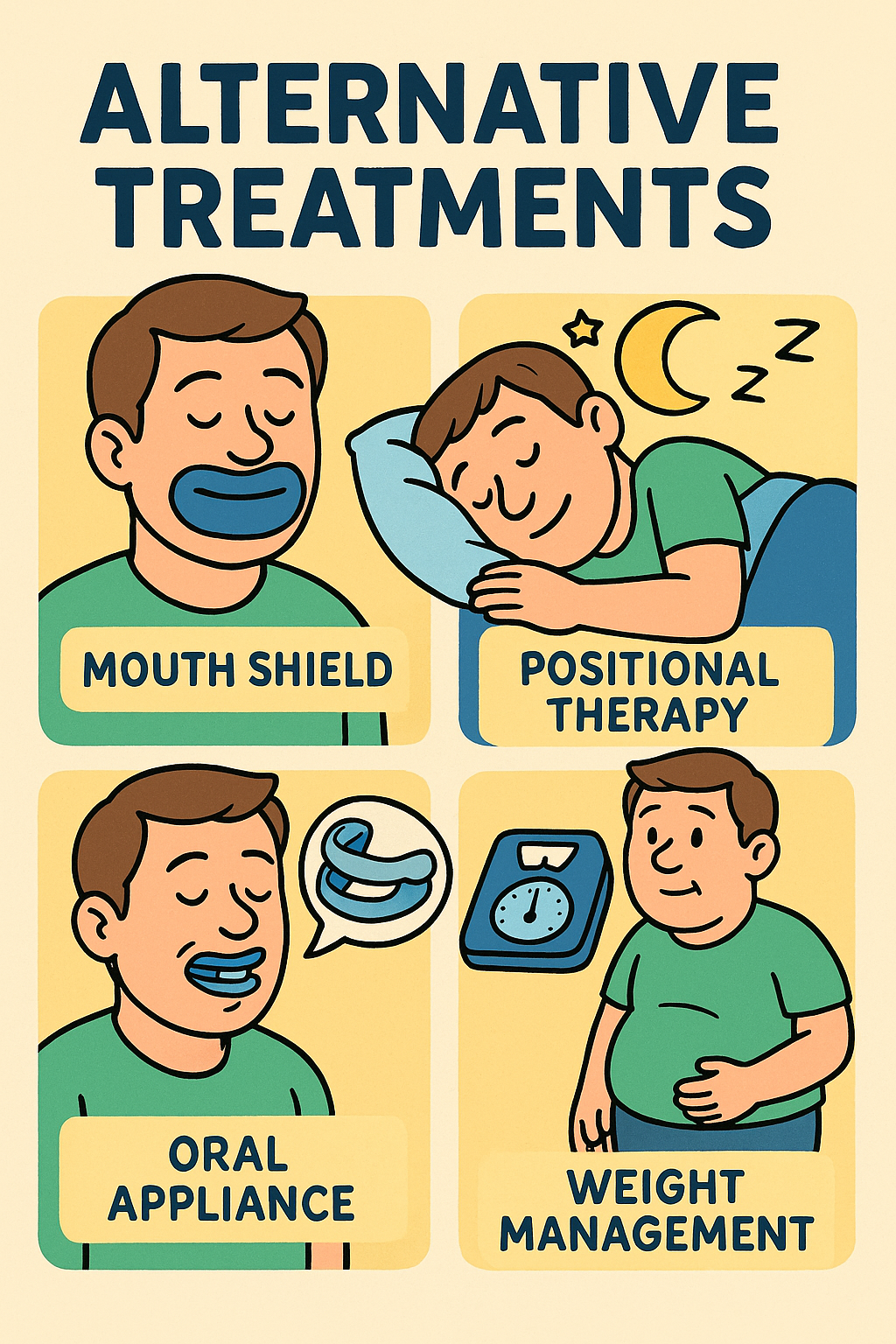Why Is My Husband Still Snoring With CPAP?
If your husband is still snoring while using his CPAP machine, you're not alone—and it’s frustrating. After all, CPAP (Continuous Positive Airway Pressure) therapy is supposed to stop snoring by keeping the airway open. But for many couples, snoring doesn’t stop completely.
Before you lose more sleep, let’s explore the real reasons behind this issue and what you can do about it. One helpful solution to consider early on is a CPAP-compatible mouth shield, which can minimize mouth leaks and improve therapy effectiveness.
✅ Key Takeaways
-
Snoring with CPAP is common and often fixable
-
Poor mask fit, pressure settings, or mouth breathing could be the culprits
-
Snoring may also indicate a deeper issue not fully addressed by CPAP alone
-
Mouth taping alternatives like Mouth Shield can reduce air leaks
-
A sleep specialist can help fine-tune your husband's therapy plan
|
Pro Tip: Still snoring with CPAP? A CPAP-compatible MouthShield can reduce air leaks and boost therapy effectiveness. Consider it for better sleep and fewer disruptions! |
Common Mistakes in CPAP Usage
Sometimes, the CPAP machine isn’t the problem—how it’s used is. A few common errors can make the therapy far less effective:
-
Mouth breathing: If your husband is breathing through his mouth while wearing a nasal or nasal pillow mask, air may escape, making the pressure ineffective.
-
Leaky mask: A poorly sealed mask can let air leak out, reducing pressure and allowing snoring to return.
-
Sleeping position: Back sleeping can worsen airway collapse, even with CPAP.
-
Inconsistent use: Skipping nights or removing the mask mid-sleep means the airway isn’t supported when it needs to be.
These problems can make it seem like CPAP isn’t working, when in fact it just needs a few adjustments. For example, using a mouth sealant like the Mouth Shield can reduce leaks and help nasal CPAP do its job more effectively.
The Role of Mask Fit and Air Pressure Settings
A snug-fitting mask and correct pressure level are essential for CPAP success. If your husband’s pressure setting is too low, it may not be enough to fully prevent airway collapse. If it’s too high, it can lead to discomfort, mouth leaks, or even central apneas.
It’s worth rechecking his equipment fit and working with a provider to review pressure settings. Sometimes even a small tweak can make a big difference. Explore more on this in our related article: Still Snoring with CPAP? Here's What You Should Know.
When Snoring Signals an Underlying Issue
Persistent snoring with CPAP could be a red flag that something more is going on. Possibilities include:
-
Untreated central sleep apnea: Unlike obstructive sleep apnea, this occurs when the brain fails to signal the muscles to breathe.
-
Upper airway resistance syndrome (UARS): A less severe but still disruptive condition that CPAP might not fully address.
-
Nasal congestion: Blocked nasal passages can cause mouth breathing and snoring even with CPAP.
If CPAP is in place and snoring continues, it’s time to dig deeper. Mouth breathing is a major factor here—and may be contributing to both the snoring and dry mouth symptoms. Learn how to manage this in How to Prevent Dry Mouth with CPAP Using MouthShield.
Alternative Treatments to Consider 
When CPAP isn't solving the snoring puzzle, there are other tools to try. These include:
-
Mouth shields to encourage nasal breathing and stop leaks
-
Positional therapy to keep him off his back
-
Oral appliances that shift the jaw forward to keep the airway open
-
Weight management, if relevant
-
Surgery, in some extreme cases
While CPAP remains the gold standard for sleep apnea, it’s not one-size-fits-all. The key is tailoring the solution to your husband’s specific needs and sleep habits.
When to Consult a Sleep Specialist
If you’ve tried the above adjustments and snoring persists, consult a sleep specialist. They can run additional tests—like a CPAP titration study or sleep lab monitoring—to assess what's really happening during the night.
A specialist may also suggest switching device types (like to a BiPAP or APAP), or combining CPAP with another treatment like a chin strap or mouth shield.
🛏️ Get Back to Quiet Nights with MouthShield
CPAP is a powerful tool, but it’s not foolproof. If your husband is still snoring, it doesn’t mean the machine is failing—it just might not be dialed in yet. A few simple changes, like checking his mask fit, adjusting pressure, or encouraging nasal breathing, can restore quiet nights for both of you.
Don’t give up—try MouthShield for better snoring control and consult with a sleep expert if needed. Better sleep is still within reach—for both of you.
💤 Frequently Asked Questions
Why does my husband still snore even with a full-face CPAP mask?
A full-face mask doesn’t guarantee a perfect seal. If there are leaks or the pressure isn’t set correctly, snoring can continue. Also, mouth breathing and poor sleep posture may still be contributing factors.
Can snoring return after adjusting to CPAP therapy?
Yes. Weight changes, nasal congestion, or equipment wear can reduce CPAP effectiveness over time. It’s smart to reassess mask fit and pressure settings regularly.
Is it safe to use something like a mouth shield with CPAP?
Yes—products like the Mouth Shield are designed to be CPAP-compatible and help reduce mouth leaks safely, encouraging better nasal breathing and improving overall therapy success.
When should we talk to a sleep doctor again?
If you’ve optimized the equipment, tried positional changes, and snoring still persists, it’s time to speak with a specialist. You may need a different device type or a more detailed sleep study.
References
-
“I use CPAP. Why do I still have apneas?”, Resmed, https://www.resmed.com/en-us/sleep-health/blog/i-use-cpap-why-do-i-still-have-apneas/
-
“Why Is Snoring Still Occurring With My CPAP Mask?”, ApneaMed, https://www.apneamed.org/blogs/info/why-is-snoring-still-occurring-with-my-cpap-mask
-
“4 Helpful Solutions If You're Still Snoring With CPAP,” CPAP.com, https://www.sleepquest.com/still-snoring-with-cpap-what-to-do/
-
“What to Do If You’re Using CPAP But Still Snoring,” The Insomnia and Sleep Institute of Arizona, https://sleeplessinarizona.com/what-to-do-if-youre-using-cpap-but-still-snoring/


